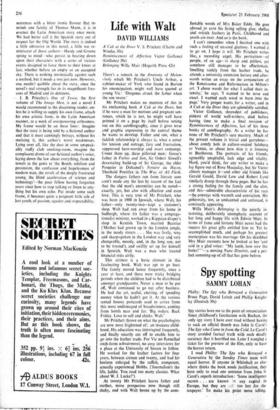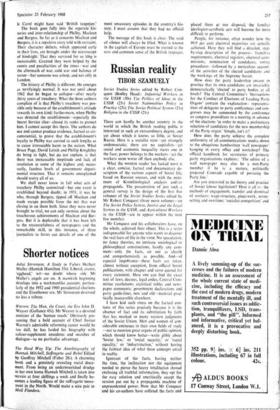Spy spotting
SAMMY LOHAN
Philby: The Spy who Betrayed a Generation Bruce Page, David Leitch and Phillip Knight- ley (Deutsch 30s)
Spy stories bore me to the point of renunciation. Since childhood's fascination with Buchan, the only spy story I have ever read without having to suck an official thumb was John le Carrel's The Spy who Came in from the Cold. Le Carre's story avoided factual truth with such 'deadly accuracy that it horrified me. Later I wangled a ticket for the preview of the film, only to have the horror return.
I read Philby: The Spy who Betrayed a Generation by the Sunday Times team with equal horror. If anyone in Whitehall or else- where thinks the book, needs justification, they have only to read one sentence from John le Carrel's superb introduction : 'Some intelligence secrets . . . are known in any capital in Europe, but they are Ntir too hot for - the taxpayer.' To make his point more telling,
le Cane might have said 'British taxpayer.'
The book goes fully into the separate his- tories and inter-relationship of Philby, Maclean and Burgess. So far as it concerns Maclean and Burgess, it is a repulsive story told with restraint. Their character defects, which appeared early in their lives, are brought under the microscope of hindsight. That they survived for so Icing is inexcusable. Granted they were helped by the events and peculiarities of the times—wat and the aftermath of war, cold war and balance of terror—but someone was asleep, and not only in London.
The history of Philby is different. He emerges as terrifyingly normal. It was not until about 1962 that he began to collapse—after nearly thirty years of treachery. What the three authors complain of is that Philby's treachery was pos- sible only because of the establishment's attitude towards its own kind; furthermore, when Philby was detected the establishment—especially the Secret Service slice—closed its ranks to protect him. I cannot accept this thesis. The authors do not and cannot produce evidence, factual or cir- cumstantial, to prove that the establishment's loyalty to Philby was carried to such lengths as to cause irrevocable harm to the nation. What Bruce Page, David Leitch and Phillip Knightley do bring to light, but do not explain, is that there was inexcusable ineptitude and lack of resolution at some of the highest and, neces- sarily, faceless levels of government depart- mental structure. That it remains unexplained should worry all of us.
We shall never know in full what acts of treachery Philby committed—but one event is established beyond doubt; in 1951, it was he who, through Burgess, tipped off Maclean and made escape possible from the net that was closing in on them both. Since they were never brought to trial, we can only surmise about the treacherous achievements of Maclean and Bur- gess. But it is deplorable that it has been left to the resourcefulness of newspapers and the remarkable skill, in this instance, of three journalists to ferret out details of one of the



































 Previous page
Previous page